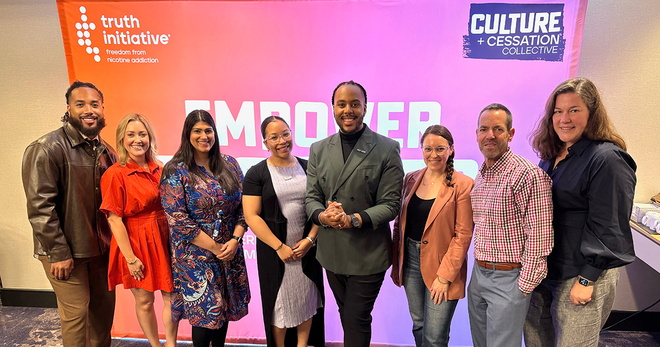The Master Settlement Agreement: 4 ways the landmark tobacco settlement changed tobacco control
Twenty-five years ago, 46 states plus D.C. and five territories brought litigation against the four major tobacco companies that resulted in the largest civil litigation settlement in U.S. history. The settlement transformed tobacco control in America and as a result, tobacco companies paid billions as compensation for taxpayer money that had been spent in connection with tobacco-related diseases and losses to local economies.
The Master Settlement Agreement (MSA) also called for the creation of an independent organization devoted to youth tobacco use prevention and included funds to found that organization, marking the first page in the Truth Initiative origin story.
Here are four ways the landmark tobacco settlement changed tobacco control.
Tobacco companies paid billions of dollars to states and territories
The MSA resolved litigation brought by 46 states plus D.C. and five territories against four major tobacco companies: Philip Morris, R.J. Reynolds, Brown & Williamson, and Lorillard, plus their trade associations. The agreement settled state lawsuits that sought billions of dollars in costs associated with treating smoking-related illnesses and losses to local economies.
These costs were enormous: the year the MSA was signed, the average annual mortality-related productivity losses attributable to adult smoking were $81.9 billion, on top of $75.5 billion in smoking-attributable personal healthcare expenditures, according to CDC data from 1995-1999.
In November 1998, the MSA was signed by the Attorneys General of the 46 states – the remaining states had settled separately with the tobacco industry on their own. The victory resulted in tobacco companies paying the states and territories billions of dollars in yearly installments.
Created restrictions on youth targeting and advertising
In addition to funds to compensate costs associated with treating smoking-related illnesses and economic losses, the states also set permanent restrictions on marketing and advertising.
Restrictions on youth targeting:
- Prohibited tobacco advertising that targets people younger than age 18.
- Eliminated cartoons in cigarette advertising.
- Prohibited brand name sponsorships, especially relating to music, sports, and events where youth make up a significant percent of the audience.
- Prohibited the distribution of discounted cigarette samples and free gifts to young people.
Restrictions on public advertising:
- Eliminated outdoor, billboard and public transit advertising of cigarettes.
- Cigarette brand names could no longer be used on merchandise.
- Prohibited payments made in exchange for showing a tobacco product on TV, in movies, video games, or any live performance, except for media shown in adult-only facilities or in media not intended for the public.
While the tobacco industry has dedicated a huge amount of resources to limit the impact of these policies and skirt regulations, these policies have provided critical protections.
Made millions of tobacco industry documents available to the public
The MSA also resulted in many millions of tobacco industry internal documents made public. The Truth Tobacco Industry Documents is an archive of 14 million tobacco company documents that cover advertising, manufacturing, marketing, scientific research, and political activities.
These documents have powered important research to better understand industry tactics to market their products and mislead the public. The MSA also took action against tobacco industry interference in scientific research by prohibiting agreements to suppress research and dissolving three industry-funded research groups which had attacked scientific studies related to the harms of tobacco use.
Founded Truth Initiative
The MSA called for the establishment of an independent national foundation to oversee a comprehensive program of public education and study of tobacco with the goal of reducing youth tobacco use and subsequent death and disease from tobacco-related harms. In 1999, the American Legacy Foundation was created as part of the MSA and became the first public health organization dedicated to ending tobacco use among youth and young adults. In 2015, the foundation’s name was changed to Truth Initiative.
Truth Initiative is widely regarded as a major success story of the MSA. Since its debut in 2000, the truth campaign has prevented millions of young people from becoming smokers - including 2.5 million between 2015 and 2018 alone - and helped drive down the youth smoking rate from 23% in 2000. In 2022, the youth smoking rate fell to a historic low of 2%. In addition to saving millions of lives, the campaign has saved billions of dollars. According to peer-reviewed research, truth has saved $3.072 billion in combined healthcare and lost productivity costs associated with smoking between 2014 and 2019 alone and resulted in $174 in cost savings for every $1 spent on the campaign.
Today, the legacy of the MSA can be seen in the multi-million-dollar settlements with JUUL for its role in igniting the youth e-cigarette crisis. The most recent JUUL settlement ordered JUUL to pay $462 million to six states and D.C. and also include marketing, sales, and distribution restrictions and called for funds to be put towards youth education and cessation programs.
More in tobacco prevention efforts
Want support quitting? Join EX Program
By clicking JOIN, you agree to the Terms, Text Message Terms and Privacy Policy.
Msg&Data rates may apply; msgs are automated.


